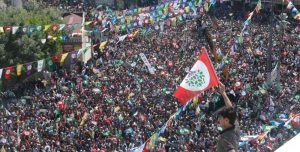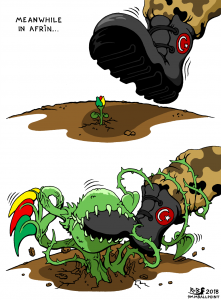What some are sarcastically calling the “anticipated results” of the Turkish election will soon be announced.
The Council of Europe has added its voice to the chorus of doubters, deeming the result to be being illegitimate in advance because of a general flouting of the fundamental conditions of a free election. But the situation is more uncertain than one might think and Erdoğan, despite his cynical and bloody political maneuvers, is on the edge of the abyss.
During our education at the internationalist academy, we received courses and held discussions on Middle Eastern politics. We were able to better understand the current Turkish political situation, the historical contradictions which run deep through Turkish society, and Erdoğan’s dangerous posture today. In a 14-year political career, he made a long list of enemies. Without hesitation he betrayed his former allies, and there are many who wish his fall. Whether in Turkey or on the international scene, everyone knows today that trusting Erdoğan is pure madness.
On June 24, Turkish citizens will elect a president, along with the assembly of their country. The elections will see the the constitutional reforms voted through in the fraudulent referendum of 2017 put into practice for the first time. The main change will be the transition from a parliamentary to a presidential regime.
In reality, Erdoğan already follows a dictatorial course of action. A month before the elections, the rules of the game were changed: joint electoral lists, and therefore alliances between parties, are now allowed.
AKP, Erdoğan’s Islamist-conservative party, has formed an alliance with the MHP. The MHP is a fascist party whose armed front, the Grey Wolves, are historically part of the paramilitary militia used in the bloody war against the Kurdish liberation movement. Trained during the Cold War by Gladio (a NATO-sponsored stay-behind network intended to launch a guerrilla war should communism reach Turkey), the Gray Wolves death squads have made a name for themselves with a succession of massacres (for example the 1978 Maraş massacre where more than one hundred Alevis civilians were slaughtered).

The Gray Wolves are still active today, and have been allowed to build up a large presence in the special forces of the police and the gendarmerie (JOH and POH). Witness the graffiti left as a calling-card on the walls of the villages of Afrin by these commandos of the Turkish army, and the Kurdish cities of Bakur drowned in fire and blood only to be posted on social networks by these soldiers, posing with the MHP’s trademark sign (a wolf’s head formed with the fingers).
Massive fraud is expected, made even easier by the striking out of rules against ballot-box stuffing and prolonging the “state of emergency”, which allows Erdoğan to govern by decrees without the control of the parliament. These hasty elections are a proof of the government’s weakness . They are hastening to capitalize on nationalist impulses following the military victory in Afrin, to take the opposition by surprise and divert attention from the serious economic crisis facing Turkey.
But the invasion of Afrin did not pave the way for the unifiying election Erdoğan hoped for. The neo-Ottoman rhetoric continues, and with it the war propaganda massively used by Erdoğan before, during and after the invasion of the enclave of Rojava in order to unite the nation behind him. He is desperately and endlessly raising the stakes, this time with Qandil and Manbij in his line of fire. As in Afrin, civilians pay the price of the cynical political calculations of the president who plays the sultan.
An obstacle that could make the difference stands in the path of the islamo-fascist alliance: the HDP. The Halkların Demokratik Partisi (People’s Democratic Party) is the main platform for democratic forces in Turkey, especially those of the Kurdish movement. A staunch defender of ethnic and sexual minorities, advocate of women’s rights and supporter of a radical democracy in Turkey, the HDP aims to develop democratic confederalism in northern Kurdistan and Turkey as a whole.
“In Afrin, civilians pay the price of the cynical political calculations of the president who plays the sultan.”
It is isolated from the other parties that have formed an anti-Erdoğan bloc, whose main components are the CHP and the Good Party. (The Kemalist CHP is the main opposition party and the Good Party is an ultra-nationalist party created by a schism in the MHP.)
This is a political force that has rallied the left in Turkey and threatens to stop Erdoğan from winning an absolute majority in the first round. Under Turkish electoral law, this would lead to a second round of voting unfavorable to the leader of the AKP. If this happened, it is possible that a vast alliance under the umbrella of “anything but Erdoğan” would emerge.
Hence the tremendous crackdown on the HDP: its two co-presidents (Selahatin Demirtas and Figen Yüksekdağ) have been in custody since November 2015, ¾ of the mayors of the party have been suspended and a significant number also arrested, and 10,000 activists are locked in Turkish prisons. On June 14, several members of the HDP were murdered with impunity by AKP activists during a violent altercation between members of both parties. One of the victims was even tracked down to the emergency ward and beaten to death with an oxygen cylinder.
Once again, the Kurdish people serve as an enemy both internally and externally, uniting the Turkish nation by nationalist racism. The military operations against the guerrilla stronghold of the Qandil mountains in South Kurdistan, and perhaps soon Minbij, serve primarily an electoral purpose and to tightens Erdoğan’s grip on power.
In our relatively quiet corner of Rojava, we do not forget that war can break out at any time. The menacing purr of Turkish drones in the night reminds us of that. Tomorrow, the Turkish army and their jihadist mercenaries could come once again to spread war and blood on the lands of Kurdistan.

The scapegoating of a group like the Kurds is one of the most used methods of fascism. But Turkish fascism is not monolithic.
As a popular analysis has it, there are three forms of fascism in Turkey. The first, white, is that of the Kemalists – an authoritarian, militarist nationalism. Black fascism is that of the MHP, based on the purity and superiority of the Turkish race. The last, the green, is the Islamist fascism represented by the AKP.
The present-day alliance between black fascism and green fascism is fragile and unstable because it is relatively unnatural. Turkey has a long history of political violence behind it, and today’s precarious allies may well be the enemies of tomorrow.
The situation is therefore unpredictable, and heating up. An alliance between Islamists and fascists in power would represent a mortal danger, and not only for the Kurds. Such a government could only beget more domestic political violence and an intensification of the policy of military expansion. Rojava would obviously be one of the first targets of such a government.
“The crisis consists precisely in the fact that the old is dying and the new cannot be born; in this interregnum a great variety of morbid symptoms appear.”- Antonio Gramsci
But these elections also represent a chance to defeat this alliance. In the case of failure in the first round, we can expect a violent reaction from a government that feels power slipping through its fingertips – especially since several corruption cases threaten Erdoğan if he loses his presidential immunity. It may be that the June 24 elections mark the breaking point where the contradictions and tensions that have accumulated in the Turkish state herald the end of Erdoğan’s reign.
The political instability that would follow such an event would create a unique opportunity democratic socialist forces and their ideas. A partial or total collapse of central power could allow revolutionary ideas to find space to be put into practice, as was the case in Rojava. That’s why we call on Turkish citizens to vote for the HDP and revolutionaries around the world to fight against Turkish fascism in their own countries and on an international footing.
Above all, let us not forget that we are still in that interregnum of which Gramsci speaks. So let’s be careful and be ready. Whether under the threat of Daesh or the Turkish state, we continue and we will continue to build the revolution and spread the struggle against the state, capitalism and patriarchy. And we will be ready. It is from these periods of historical upheaval that Utopias have their chance, but it is also from such interregnums that monsters emerge – or resurface.